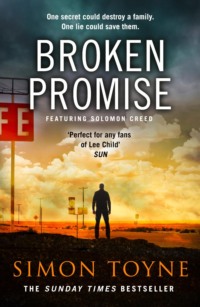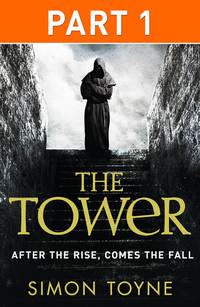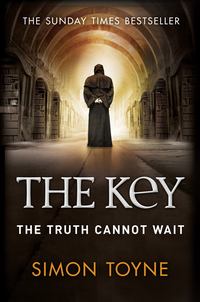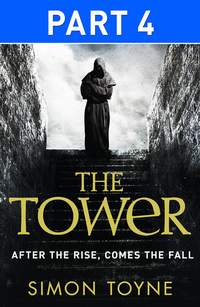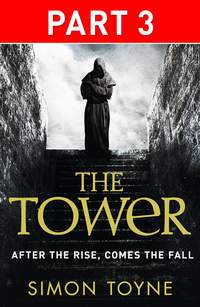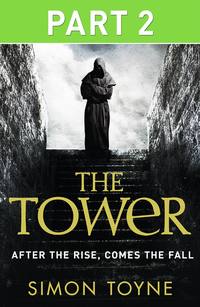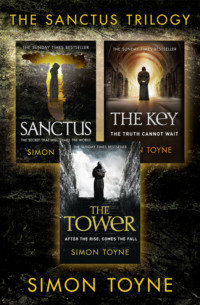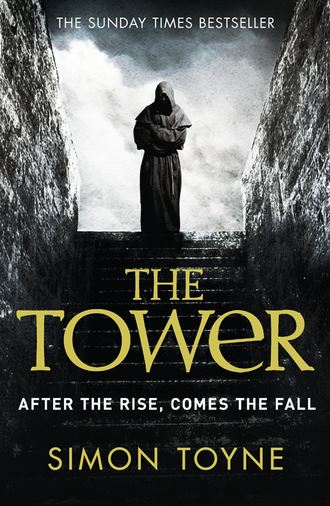
Полная версия
The Tower
‘’Bout twelve years back,’ Franklin said, peering at the darkening forest ahead as if he could see the lost years among the trees, ‘I was part of a six-man task force running an investigation into a string of hit-and-run bank jobs across the Ohio–Indiana state line. In each case a lone, masked gunman stormed into a small out-of-the-way bank, grabbed a hostage – always a woman – and threatened to shoot her if anyone tripped an alarm. He was smart to a point because the size of the banks meant security wasn’t top of the line so we didn’t have any decent security camera footage. Also he never got greedy so was always out and away within a couple of minutes. And he always took the hostage with him, saying if he heard so much as a car alarm he would kill her.
‘As you can imagine the local press shook up a hornets’ nest of fear about it all but there was also a bigger concern: none of the hostages were coming forward afterwards. For about a week or so we lived in fear of getting a call from some hunter or dog walker who had stumbled upon the silenced corpse of one of our unfortunate bank customers. Then he hit another bank, third in a month, and we got fresh footage.’
Franklin directed Shepherd away from Hogan’s Alley and towards the path through the forest that led to the main building complex beyond.
‘This is how it went down. Woman walks into the bank, talks to the door guard; gunman comes in and disarms the guard while he’s distracted, grabs the woman, robbery ensues then perp leaves with a hostage. We could see by comparing the clear images of the new footage with the fuzzy older stuff we had that it was the same woman every time. Turns out she wasn’t a hostage at all, she was one of the crew. That’s why no one was coming forward afterwards.
‘We quietly spread the word among the state banks, so when they pulled another job ten days later in Des Moines, a teller tripped the alarm and the cops got there in plenty of time to pick ’em up. When he was cornered the gunman tried to pull the same hostage routine, said he was going to kill her if they didn’t give him a car and a free pass. Cops just told him, “Go ’head, shoot her.” All of which brings us back to your little situation. Tell me what you knew about your suspect from the mission brief?’
Shepherd dug his hands deep in his pockets and tried to focus on something other than how cold he was. ‘The intel said he was on several international watch lists as a known terror suspect. Believed to be a Jihadist, trained in Afghanistan by Al-Qaeda.’
‘And from your reading and case studies do terrorists and other religiously motivated individuals tend to give themselves up to officers of an enemy state they believe they are conducting a holy war against?’
‘No.’
‘No they do not.’
The trees parted to reveal the Quantico Hilton rising up in front of them, all square lines, slit windows and concrete. This was where the labs and active case teams were housed; proper on-going, messy cases with as-yet undiscovered solutions, not the clean textbook ones Shepherd was being weaned on. It could easily have passed for a small mid-western high-school campus had it not been for the sound of gunfire crackling out of the forest behind them. The next recruit must have made it to the basement. Shepherd hoped he or she was doing better than he had. Hearing the shots reminded him of all the paperwork he needed to fill out back at the briefing room. The forms for discharging your weapon during an exercise were thorough, tedious and in triplicate for very good reason: it stopped the recruits from getting trigger-happy.
‘Don’t worry about the admin,’ Franklin said, apparently reading his mind. ‘I’ll square it with Agent Williams. You can fill it in and file it after.’
After what? Shepherd wanted to ask, but Franklin was already halfway towards the glass doors of the main building.
‘Never forget that you are a highly and expensively trained officer, son. In the currency of law enforcement that makes you an asset to Uncle Sam and a much-valued target to a terrorist. If you don’t take the shot, odds are the bomber will push the button anyway and there will be three bodies to scrape out of that basement instead of two. The hostage dies either way. And, given the little story I just told you, how do you know the hostage was even friendly?’ They moved from the frigid night into the brightness and heat of the executive building. ‘You have to wonder what that woman was doing at dusk in a rat-hole basement with a known terrorist in the first place. I can understand you being upset that you shot someone who might be innocent, it’s a credit to you, but don’t lose sleep over it. You made the right choice, Shepherd. Though you do need to work on your marksmanship.’
They passed the honours board that dominated the glass atrium with the name of every top-of-the-class graduate written in gold, dating right back to 1972 when the doors first opened. Shepherd doubted his name would ever grace it. He was a good few years older than the average intake, which showed in his fitness scores, and his shooting was clearly letting him down. The things he really excelled at were not part of the five areas of ability that went towards his final mark; his expertise had not even been thought of when the FBI first came into being.
The elevator door opened and Franklin stepped inside, waited for Shepherd to join him then pushed button number 6. Shepherd’s mouth went dry. The sixth floor was where the most senior personnel lived.
‘You cannot have doubts out in the field,’ Franklin said, his soft voice sounding conspiratorial in the confines of the elevator. ‘Because if you hesitate in a situation like that, you die, or, worse still, your partner does and you end up carrying it around with you for the rest of your life. They don’t put this sort of thing in any of the manuals but I’m telling you how it is, for your own sake and for mine – especially if we’re going to be working together.’
The door swished open before Shepherd had time to respond and Franklin headed down the silent corridor, checking his watch as he passed all the heavy doors belonging to the sub-division chiefs. The corridor was arranged according to rank with the lesser chiefs nearest the elevator. Franklin swept past them all, heading straight for the door at the very end with Shepherd close behind, feeling like he was back in high school and had been summoned to the principal’s office. Only here the ‘principal’ was one rung down from the Director of the FBI, who himself was just one down from the President of the United States of America. Franklin stopped outside the door, checked his watch one last time then rapped twice above a nameplate spelling out: ASSISTANT DIRECTOR.
In the softened silence of the corridor they sounded like gunshots.
‘Come in,’ a deep voice rumbled from the other side.
Franklin gave him the smile, only this time the warmth wasn’t there and it occurred to Shepherd that maybe he was nervous too. Then he opened the door and stepped into the room.
4
Assistant Director O’Halloran was a thin blade of a man worn sharp by a lifetime in the Bureau. Everything about him was hard and precise: the steel rims of his spectacles; the pale grey eyes behind them that looked up as Franklin and Shepherd entered the room; even his gunmetal hair appeared to have been parted with a scalpel rather than a comb. He was sitting at the same immaculate desk he had been photographed behind on the recruitment literature that went with the application form Shepherd had filled out almost a year ago: same flatscreen monitor, same keyboard, same desk phone and framed photograph. The only things different were the two files on the desk in front of him: one plain, the other with Shepherd’s photograph printed on the first page. Shepherd’s pulse quickened when he saw it.
‘You have quite the impressive resumé,’ O’Halloran said, tapping a thin finger on the file with the photograph. ‘Mathematics major with computer science at the University of Michigan. MSc in physics from CalTech. Best part of a PhD in theoretical cosmology from Cambridge University in England – though you never finished that one, did you? Even so, I imagine you could be making six figures and upwards in the financial sector, yet you chose to sign up as a GS-10 with a basic starting salary of $46,000. Why is that I wonder?’
Shepherd swallowed drily. ‘Money’s not that important to me.’
‘Really, you a Communist?’
‘No, sir – I’m a patriot.’
‘OK, Mr Patriot, tell me about your PhD, why didn’t you finish it?’
Shepherd glanced down at the file, recalling the psychiatric evaluations and background checks that had formed part of his recruitment screening. All of it would be in there, at least everything he had told them. But this was the Assistant Director he was talking to so there could well be other things in there by now – things he had hoped to keep hidden.
‘It’s all in the file, sir.’
O’Halloran regarded Shepherd from the centre of his stillness. ‘I want to hear it from you.’
Shepherd’s mind raced. He was being tested and Assistant Director O’Halloran was far too senior for it to be about something trivial. If it was to do with the parts he’d left out of his past then Franklin could easily have questioned him about it back at The Biograph, which meant it had to be about something else. He should stick to the story he’d already told, volunteer no new information, and hope things became clearer over the course of the next few minutes.
‘I had been in academia all my adult life,’ he said, saying the same lines he had spoken to his recruitment officer. ‘It was everything I knew but not everything I wanted to know. Some people like to gather knowledge just for knowledge’s sake, I always intended to apply mine.’
‘NASA.’
Shepherd nodded. ‘A large proportion of my education was funded by Space Agency scholarships. I also spent a lot of research time on various NASA projects, which is pretty standard for anyone on one of their scholarships: they get extra brain power, we get our feet under the table and gain practical experience of the work we will hopefully end up doing.’
‘So what happened?’
‘9/11 happened – sir. Homeland defence and the war on terror became the number one priority. It took a big bite out of everyone’s budget. Almost the entire space program was shelved. I suddenly found myself with no grant and no job to go to even if I did manage to complete my studies. It was … like hitting a wall.’
‘So you dropped out.’
‘That’s one way of putting it, sir.’
‘How would you put it?’
‘At first I felt cheated, like something had been taken away from me. It seemed pointless to carry on studying for a job that was no longer there. There were plenty of private companies offering to fund the remainder of my studies but they all wanted me to sign my life away in exchange. Work for them as soon as I graduated, study stock markets instead of stars. It wasn’t what I wanted. So I took off and went travelling to clear my head and try and work out what I was going to do with my life now NASA no longer appeared to be an option.’
‘Where did you end up? There’s a gap in your file of almost two years where you seem to have disappeared off the face of the earth: no social security records, no job history, no credit card records.’
‘I was off the grid mainly – Europe first then Southeast Asia and eventually Africa, travelling from place to place, working cash jobs in bars and as migrant labour on farms, staying in backpacker hostels that charged by the night. They don’t take credit cards in most of those places. I’d been a student for most of my adult life so I knew how to live cheap.’
‘Then what, you saw the light and decided to rejoin society?’
‘Yes, sir. I realized I was squandering an opportunity. What happened on 9/11 changed my life – but almost three thousand other people lost theirs. My future had been altered; theirs had been taken away. My intention had always been to pay back the money for my education by devoting myself to public service and working for NASA. I came to realize that just because that particular opportunity had been closed to me didn’t mean I couldn’t pay my dues in other ways.’
‘So you signed up for the FBI?’
‘Not immediately, sir.’
‘No, that’s right.’ O’Halloran opened the file for the first time and flipped to a page near the back. ‘First you worked as a volunteer for various aid agencies, setting up computer networks and fundraising pages and teaching computer skills to homeless people and the long-term unemployed.’ He looked back up. ‘You really weren’t kidding about money were you?’
‘No, sir – it’s never been something that has particularly motivated me.’
O’Halloran pursed his lips and studied Shepherd like a poker player deciding which way to bet. ‘I’m not entirely happy that the Bureau I have served all my adult life seems to be some kind of consolation prize for you, Shepherd, but I can’t afford to turn away a candidate with your qualifications.’ He closed the file and laid a hand on the second one. ‘Are you familiar with the Goddard Space Flight Center?’
‘Yes sir, I spent a few summers there running test data off Explorer 66.’
‘Is that anything to do with the Hubble Space Telescope?’
‘Not really. They both collect data from the furthest edges of the universe, at least they did – Explorer is pretty much used as a test satellite now. Hubble does everything Explorer used to and has a much greater reach.’
The lips pursed again. ‘Not any more.’ O’Halloran opened his desk drawer, removed a badge wallet and handed it to Shepherd. ‘I am not in the habit of sending trainees out in the field before they have completed their training or spent at least a year in a field office, but apparently, out of more than thirty thousand currently active Bureau personnel, you are uniquely qualified for a situation that has arisen.’ Shepherd opened the wallet and saw his own photo staring back from an FBI ID card. ‘That will temporarily entitle you to carry a concealed weapon and transport it onboard commercial airlines. You can collect your Roscoe and a box of shells from Agent Williams on your way out.’
Shepherd read the name printed next to a date that expired in a month. ‘My middle name is Thomas,’ he said, turning the badge to O’Halloran.
‘There’s already a Special Agent J. T. Shepherd in the Memphis office and, as no two agents can have the same ID,’ he raised his hand and made a small sign of the cross in the air, ‘I now baptize you J. C. Shepherd. That’s your Bureau name, and you will answer to it. I am placing Agent Franklin in full command of the investigation and you are to follow his lead exactly. You have been assigned to this investigation solely because of your unique and considerable expertise in the field of astronomy. You will use it to assist Agent Franklin in this investigation and give your opinion only when it is requested. The rest of the time you will look upon this as a valuable opportunity to learn on the job from a well-seasoned and highly regarded agent. Once your usefulness to the investigation has been exhausted, your temporary status will be revoked and you will report back here to finish your training, understood?’
‘Yessir.’
‘I trust you know your way to Goddard from here? There’s a car signed out to you in transport.’ He took the plain covered file from the desk and held it up. ‘Agent Franklin can brief you on the way.’
5
Shepherd and Franklin drove for the first ten minutes in total silence, the whump of windscreen wipers and hiss of tyres over wet tarmac punctuated only by the rustle of paper as Franklin read through the file. Occasionally he jotted a note in a pocketbook lit by the glow of a small Maglite clamped in his teeth. Shepherd sensed he was unhappy about the situation. That made two of them.
After his performance on Hogan’s Alley the last thing Shepherd wanted was to be heading out into the real world with a loaded gun tucked into his jacket. As promised, Agent Williams, the firearms instructor, had been ready and waiting in the armoury with an oiled SIG 226, which he made Shepherd speed-load from an open box of 9x19 Parabellums while he looked on. Shepherd’s Catholic education had hammered enough Latin into him to know that para bellum meant ‘prepare for war’. He tried to push the thought from his mind as he slotted fifteen shells into the magazine, fumbling two, before smacking it home and looking up into the pained expression on the instructor’s face.
‘Do yourself a favour,’ Williams had said, as Shepherd signed for the gun and the spare shells, ‘try not to put yourself in any situation where you may have to draw this weapon. Just keep it in your holster and come back as quickly as you can to finish your training.’
Shepherd checked the rear-view mirror. Behind him he could see the lights of the grey panel van that had followed them out of the gates at Quantico. It was a tech wagon, loaded with forensics equipment and two Physical Science Technicians ready to process the crime scene his former workplace had now become. They were on I-95, heading north: the bright lights of DC spread across the horizon ahead of them like a luminous stain, lighting up the low cloud that was spilling monsoon-level rain over everything. The weather was slowing them down but at least it would be too late for commuter traffic to be a problem when they eventually hit the capitol. He figured they would be in Maryland in twenty minutes, though he still had no idea why they were heading there.
The Maglite twisted off in the passenger seat and Shepherd heard the creak of the vinyl seat as Franklin turned to him. ‘That little story you span back there,’ he said, ‘your tale of travel to the far corners of the world to find yourself – I just want you to know, I ain’t buying it.’
Shepherd felt heat on his cheeks and was glad it was too dark for Franklin to see. ‘I don’t follow you, sir.’
‘I’ve spent over twenty years talking to people who have done everything from write bad cheques to kidnap children so they could torture them for fun, and you know what every single one of ’em had in common? They all tried to lie to me. Now you may have all your highfalutin’ degrees in astrophysics and rocket science and whatever else, but I got a degree in people and I know when someone is spinning me a line. I can smell it on them, and right now, Agent Shepherd, you stink.’
Shepherd said nothing and kept his eyes on the road.
‘Now I don’t really care all that much why you’re lying or even what it is you’re hiding, what does concern me, however, is having a partner I can’t trust. Having a partner you can’t trust is like having no partner at all, and that’s dangerous, Agent Shepherd, as you just discovered down in that basement. So if at any point you feel like kicking a piece of the truth in my direction – man to man, partner to partner, in the knowledge that, felonies aside, it will go no further – then we’ll get along a whole lot better. In the meantime, operate on the assumption that I’m apt to doubt every single goddam word that comes out of your mouth, understood?’
‘Sir, I promise you …’
Franklin raised his hand and turned his head away. ‘Don’t make it worse by lying to me again. I’m being honest with you, Agent Shepherd, I’m just asking for you to do the same.’
The seat creaked as Franklin turned back to the briefing documents. ‘OK, now I’ve put it out there so you know where we stand you can make yourself useful and explain to me the wisdom behind spending over a billion tax dollars putting a telescope into space that then costs over forty million dollars a year to run.’
Shepherd stared ahead through the spray and considered the question, relieved to be back on safe, familiar ground. He thought about the unimaginable distances the Hubble Space Telescope could penetrate compared to the relatively puny ones achieved by terrestrial instruments. He thought about the light from dead stars it could gather from the pure nothingness of clear space, carrying information all the way back from the beginning of time. But in the end he kept it simple. ‘How many stars can you see tonight?’ he said.
Franklin looked out into the wet, black night as a Big Rig hooned by, going way too fast for the weather and throwing up so much spray you could hardly see the edge of the freeway let alone the sky. ‘OK, fair point, but why not just build a telescope on top of a mountain in Mexico or somewhere the sun always shines. Hell, why not just wait for a clear night, be a lot cheaper.’
‘They did all that. There’s a fifty-metre dish on top of the Sierra Negra volcano in south Mexico that can observe both northern and southern skies. It’s pretty impressive. Trouble is the earth keeps turning, so it can only study a piece of sky for a few hours at a time. A space telescope like Hubble can lock onto a distant object and keep it in its sights for months, years even, while the earth turns beneath it.’
‘And that costs forty million a year?’
‘It’s a very complicated process.’
Franklin grunted. ‘Sounds like a scam to me.’
Shepherd considered letting it go but didn’t want to slip back into the uneasy silence. ‘How good a shot are you?’ he asked.
‘Better than you, Special Agent.’
‘You think you could hit a tin can on the side of the road from a moving car?’
‘Depends how fast the car is going.’
‘Say it’s doing thirty.’
‘Nine times out of ten.’
‘What if the car was doing eighty-five?’
Franklin considered. ‘Maybe three out of ten.’
‘OK, now imagine the car is doing eighty-five thousand miles an hour and the tin can is on the other side of the country, perched on top of the Hollywood sign. Think you could hit it then?’ Franklin didn’t reply. ‘Hubble could. It could lock onto that can and take a picture of it so steady you could read the label. It’s orbiting the earth at around seventeen thousand miles an hour, and the earth is orbiting the sun at sixty-seven thousand miles an hour. That’s a total of eighty-four thousand miles an hour and yet Hubble can still fix onto a tiny patch of sky nearly fifteen billion light years away. It’s one of the greatest miracles of modern technology, the pinnacle of man’s achievements in science. That’s why it cost so much and needs all that money to run it.’
‘And all of that is controlled out of Goddard?’
‘Yes.’
Franklin shook his head. ‘Not any more – right now your gold-plated telescope couldn’t hit a barn door with a banjo. It’s spinning around up there like a bottle at a frat party. Someone managed to upload a virus that knocked out the guidance system and shut down all communication.’
‘Really? That would be – very difficult.’
‘How difficult?’
‘When I was working at Goddard they had a small systems security scare. One of the ground operating stations for another satellite was left wide open via an email account and some kid hacked into it. He didn’t do any damage but some of the ops systems got infected with internet junk that flowed in through the hole he’d made. It was picked up pretty quick and fixed but it prompted a review of the whole system. How much do you know about government cyber security?’
‘About as much as you know about firing guns.’
‘OK, so all state owned and operated computer operating systems are rated according to the Orange Book scale drawn up by the Department of Defense. This lays out specific security criteria for all government systems ranging from a D grade for non-sensitive, clerical stuff all the way up to beyond A1 for things like the NSA, the FBI and the military systems that launch the nukes. Following the scare at Goddard all the operating systems had to be upgraded to at least an A1. That means the prospect of Hubble’s ground-based operating system being breached by any kind of regular cyber attack is extremely unlikely. It would be like a junkie with a twenty-dollar pistol knocking off Fort Knox. Whoever did this must have known exactly what they were doing.’


